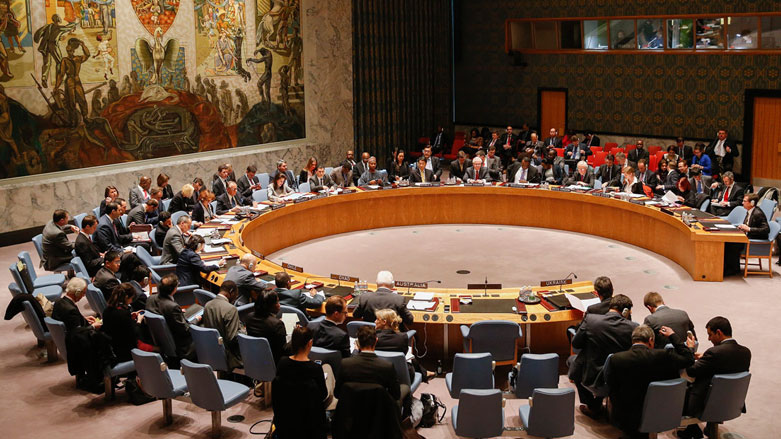Russia again blocks vital aid to millions in northern Syria
Russia on Tuesday pressured Germany and Belgium to remove the demand to reopen the al-Yarubiya border crossing in a draft resolution which endangers millions of civilians in northeast Syria in exchange for keeping two border crossings open to a different area for 12 months.

ERBIL (Kurdistan 24) – Russia on Tuesday pressured Germany and Belgium to remove the demand to reopen the al-Yarubiya border crossing in a draft resolution which endangers millions of civilians in northeast Syria in exchange for keeping two border crossings open to a different area for 12 months.
However, Russia and China also blocked this UN Security Council draft resolution blocking aid to thousands in the northwest, even with the added threat of the COVID-19 pandemic.
The German and Belgian draft resolution proposed in mid-June suggested reopening the al-Yarubiyah crossing from Iraq to northeast Syria for six months and extend approval of cross-border aid of two border crossings from Turkey to the Idlib province without the involvement of the Syrian government.
“Now, we understood that the reopening of Yarubiyah was a red line for one member state (Russia), although this was broadly supported. In our search for consensus we had thus put forward a text with the two crossings in the north west for a duration of 12 months,” co-sponsors of the draft resolution Germany and Belgium said in a joint statement on Tuesday. “We regret that this was not acceptable for all Security Council members.”
US Ambassador to the United Nations Kelly Craft said in another statement that the “resolution was already a bitter compromise, having stripped renewed authorization for a crucial third crossing point into northeast Syria.”
In December, Russia and China both vetoed a Security Council resolution that would kept the al-Yarubiah border crossing open, which connects areas in Syria governed by the local Autonomous Administration of North and East Syria (AANES) eastward to Iraq. As a result, this crossing was closed on Jan. 10.
Read More: Russia, China veto UN vote, limiting humanitarian aid to Syria
Russia wants Damascus to control all UN-aid coming into Syria and remove all cross-border assistance outside of the control of Damascus.
Human rights groups and other observers have said that this is highly problematic given that Damascus has routinely weaponized access to food and other humanitarian aid to civilian populations throughout the nearly 10-year ongoing Syrian civil war.
“Our position on the cross-border mechanism is well known. We voiced it back in 2014, and since then it has remained unchanged. The mechanism was conceived as an emergency temporary measure,” Russia’s UN Ambassador Vassily Nebenzia argued.
Furthermore, the Russian Foreign Ministry on Tuesday said in a statement that there was no need to reopen the al-Yarubiyah crossing since the World Health Organization (WHO) delivered 85 tons of medical aid to northeast Syria through Damascus on July 4. “However, this operation, as well as many other land and air humanitarian convoys that had arrived in Syria prove the opposite,” the Russians said.
Renas Sino, co-founder of the non-profit organization TEVN International told Kurdistan 24 that although the al-Yarubiyah border crossing was closed, there was a shared view of Iran, Russia, and Turkey reported during their last meeting in Astana on July 1 that to close it will undermine the local self-administration.
“Russia wants to push the self-administration to work with the regime more and for the regime to be the main central point for humanitarian aid in northeastern Syria and they can control all the international aid mechanisms from the EU and the UN.”
He added that Turkey and also Iran indeed want this border crossing to be closed to further undermine the local administration.
Therefore, Sino said the international community must do more to send international aid to northeastern Syria, now is suffering from widespread medical shortages in the health sector and an ever-worsening economic situation.
“Now, we have many crises in the northeast; there is a food shortage due to the lack of bread and there is also a lack of electricity and water. The international community should do more to send aid and can airlift food aid to the northeast of Syria. The international community should be stronger because Russia and China will always veto their resolutions.”
As a result of the Russian and Chinese obstruction, member states supporting the border opening will have to work in the coming days with Russia, the United States, and China to find a consensus before the resolution is set to expire on July 10.
Russia has already proposed an alternative draft solution to keep the Bab al-Hawa crossing open as an alternate for another six months while the US have called for a reversal of the veto.
Since there seems to be no hope that al-Yarubiah will be reopened in the foreseeable future, civilian populations of northern Syria, yet again, will see real-world effects of the lack of political consensus that remains entirely beyond their control.
Editing by John J. Catherine